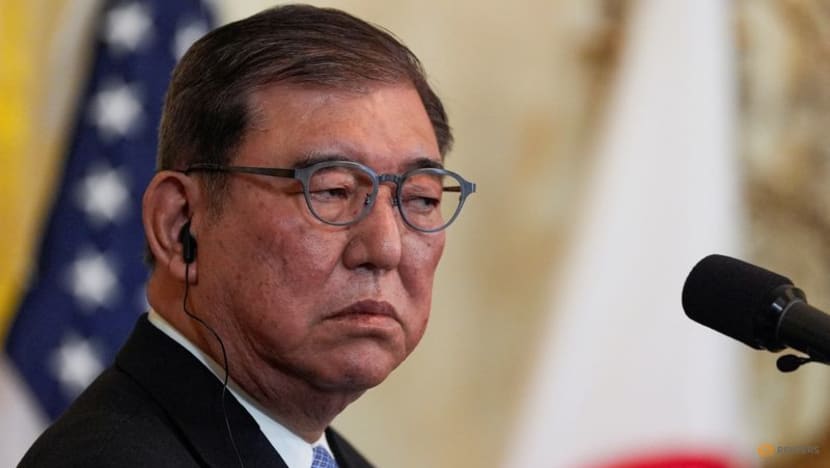Commentary: ‘Mr Japan’ is entitled to be furious with Trump’s copy-and-paste tariffs
US President Donald Trump’s brinkmanship might be setting up another TACO trade. The lasting damage to a vital friendship shouldn't be underestimated, says Bloomberg Opinion’s Gearoid Reidy.

TOKYO: “You will never be disappointed with The United States of America.”
So went President Donald Trump’s sign-off in his letters issued to 14 trading partners on Monday (Jul 7). But in Tokyo, Prime Minister Shigeru Ishiba will be more than disappointed. He’s entitled to be furious.
Japan was among the first countries to begin talks after April’s “Liberation Day” tariff announcement. It has spent months in negotiations, with Ishiba’s envoy making seven trips to the US for talks with Trump and other officials. The nation has been the largest investor in the US for the past five years and is a crucial security ally.
All that only to end up with a tariff rate 1 percentage point higher than first proposed three months ago.
To add insult to injury, Japan was lumped in with countries that are far less vital partners, including Kazakhstan and Myanmar.
While the threatened rates to be enacted on Aug 1 were different between countries, the copy-and-paste wording sent to the respective leaders was virtually identical, including telling Tokyo to open its “heretofore closed trading markets” – whatever that means.
MORE THREATS CHIP AWAY AT TRUST
The warning signs were there after Trump erupted last week. Overnight, it seemed, Japan went from being respected, or “tough”, in Trump parlance, to being “spoiled”. And while “Mr Japan”, as Trump seemingly dubbed Ishiba, may not have ended up with the 35 per cent tariffs once threatened, months of talks have only led to further threats.
In Seoul, recently elected President Lee Jae-myung might be feeling hard done by, too. His country is moving to address US concerns over non-tariff barriers, but has been hampered by the political turmoil prior to Lee’s election.
Japan might have thought it was getting the first-mover advantage Treasury Secretary Scott Bessent promised to countries that came to the negotiating table fast. Instead, an identical rate has been levied on both countries.
Markets in Tokyo and Seoul barely skipped a beat, buying into the TACO (Trump Always Chickens Out) trade as it quickly became clear that the letter was, in effect, an extension of the Jul 9 deadline. Trump’s further suggestions that the deadline wasn’t “100 per cent firm” make this clearly the latest in his “Art of the Deal” brinkmanship to wring out more concessions.
And in Japan’s case, Trump’s 25 per cent auto tariffs – the elimination of which is Ishiba’s primary goal – are already in effect. That’s why the longest-lasting impact of Monday’s announcement will be to further chip away at trust between Washington’s most vital partner in staring down China.
JAPAN’S BIGGEST PROBLEM
The prime minister has stood surprisingly firm in the talks, while making good-faith efforts to engage with the US. But might his engagement have been too earnest?
Flattery and a bit of exaggeration may have been the better way to go, perhaps taking a page out of SoftBank Group founder Masayoshi Son’s handbook in dealing with the president. This might help sidestep Tokyo’s biggest problem: The difficulty in understanding what Trump actually wants.
Local media have already reported how officials have been baffled by the open disagreements between the US negotiators. A vague hand wave – promises to place an Ford F-150 in every Japanese garage, or whatever Trump wants to hear – might be a better way to buy time.
Trump is clearly pulling out the seat at the negotiating table. But Ishiba already has his hands full with crucial Upper House elections on Jul 20, where he can’t be seen to be giving concessions or selling rice farmers down the river. Still, the latest move could even be advantageous to him; after all, no one likes a bully.
Meanwhile, any expectations that the Bank of Japan will hike rates later this month – at a meeting scheduled the day before the tariffs come into effect – should prepare for disappointment.
The longer-term consequences are harder to read. It’s possible, even likely, that Trump will have another of his trademark changes of heart, and suddenly Japan, South Korea and the other trading partners will be US friends again.
Constantly kicking the can down the road indicates he doesn’t really want to follow through with his threats.
But such incessant bluster chips away at goodwill built up between the partners over decades. And that’s something that can’t simply be copied and pasted.

















